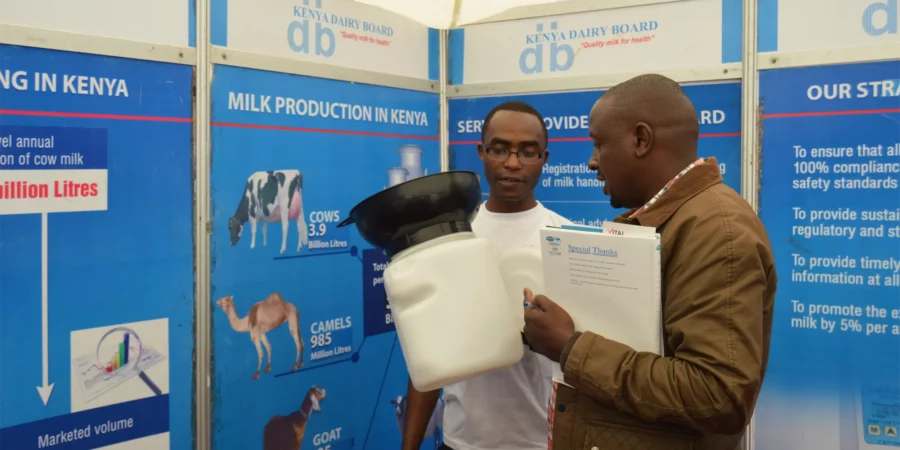Alright, fellow Kenyans, let’s talk about our dairy industry and the need for some serious regulatory action. The Kenya Dairy Board (KDB) is shouting from the rooftops that we need a robust framework to ensure that our milk meets quality and safety standards. And you know what? They’re absolutely right!
Dr. Margaret Kibogy, the Managing Director of KDB, knows the score. She’s all about this framework at both the national and county levels. Why? Well, because it’s not just about compliance, my friends. It’s about protecting us, the consumers, encouraging private sector involvement, attracting investments, and making sure our milk and milk products can be traded both here and abroad.
Dr. Kibogy dropped these truth bombs during a public participation event in Nakuru, where they were discussing the Draft Dairy Industry Bill of 2023. She made it clear that Kenya, as part of the international community, needs to get in line with the global agricultural trade standards set by the World Trade Organization back in ’95. We can’t be left behind, folks!
Our current legislation for the dairy sector was established way back in 1958. Yeah, that’s practically prehistoric! It’s outdated and doesn’t keep up with modern farming practices and technological advancements. Plus, get this, it only acknowledges cow milk. What about our sheep, goat, and camel milk? They deserve some recognition too! That’s why the proposed Dairy Industry Bill of 2023 aims to fix this oversight and include all dairy sources.
So, what’s the plan with this bill? Dr. Kibogy spilled the beans. It’s all about making our dairy products more productive and competitive, boosting local consumption, turning us into net exporters, and shaking things up in milk processing. And that’s not all! The bill wants to promote commercial dairy farming among us locals, set up a corporation to coordinate sector activities, and give us a solid legal framework for value-addition in the dairy chain. It’s a milk revolution, my friends!
Now, let’s talk about the demand for milk. It’s going up, up, up! And that’s because our population is growing, we’re urbanizing like crazy, and incomes are on the rise. The government knows this and has some strategic plans in place, like the Dairy Master Plan, which will guide us until 2030. We’re serious about meeting that milk demand!
But hold on a second, folks. We can’t forget about sanitary and phytosanitary standards. They’re crucial! We’re talking about regulations for labeling, nutrition claims, quality, and packaging. If this bill becomes a reality, it will also tackle issues like keeping our milk free from nasty microorganisms, setting limits for veterinary drug residues, allowing safe food additives, and making sure our packaging is up to par. It’s all about safety and quality, people!
Dr. Kibogy doesn’t mess around when it comes to our well-being. She wants to make sure that our milk and milk products are safe, not just for us but also for folks outside our borders. She highlighted the risks of inadequate controls—nasty diseases like brucellosis, tuberculosis, and cholera can lurk in milk if we’re not careful. Let’s keep those diseases at bay, shall we?
Now, let’s talk numbers. Our dairy industry is growing at a rate of around five percent per year. That’s not too shabby! And get this: 1.8 million smallholder farmers depend on dairy production for their livelihoods. That’s a lot of folks! The sector also contributes four percent to our national GDP. It’s a milk-powered economy, my friends.
According to the 2020 Kenya National Bureau of Statistics Food Balance Sheet report, we love our milk. It’s the king of per capita consumption in Kenya, followed by maize, wheat, and veggies. We know how to appreciate our dairy goodness!
But let’s not forget about our counties. Nakuru County is stepping up its game to support farmers. They’ve set up 11 bulking and chilling plants, and they’re organizing farmers into cooperatives to boost their finances and ensure that the milk hitting the market is top-notch.
But hey, there’s a problem too. Milk hawking is running rampant because we don’t have enough machinery. Some folks out there are adulterating our precious milk with stuff that’s not fit for human consumption. That’s not cool, not cool at all! Nakuru County has a plan, though. They’re promoting milk chilling to reduce post-harvest losses, and they’re bringing in new milk handling technologies to improve preservation and bulking. It’s all about helping our farmers and their profits!
These cooling plants are a game-changer. They give our dairy farmers a chance to store and sell their milk to processors at fair prices and whenever it’s convenient for them. Let’s keep that milk flowing and those profits growing!


Leave a Reply